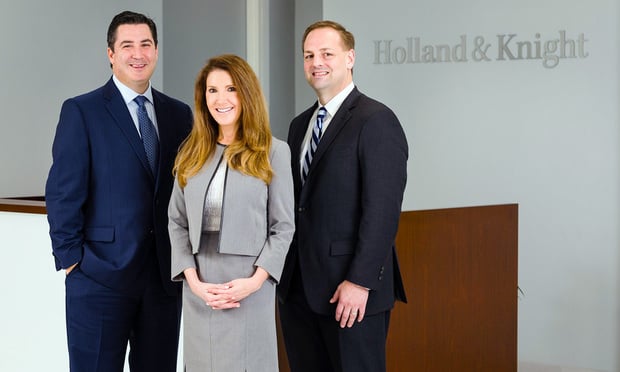Ex-Dewey CFO Jailed After Failing to Pay $1M Fine
Manhattan Supreme Court Justice Robert Stolz ordered Joel Sanders, the former Dewey & LeBoeuf CFO convicted last year on felony charges related to a scheme to defraud the defunct firm's lenders and investors, into custody.
November 15, 2018 at 12:37 PM
6 minute read
 Joel Sanders and family members head into court for his October 2017 sentencing.
Joel Sanders and family members head into court for his October 2017 sentencing.
Former Dewey & LeBoeuf chief financial officer Joel Sanders was led out of a New York courtroom in handcuffs Thursday after a judge found he willfully failed to pay part of a $1 million fine in his sentence on felony convictions.
Manhattan Supreme Court Justice Robert Stolz on Thursday ordered Sanders into custody after shooting down a bid from the former Dewey executive and his defense lawyer, DLA Piper partner Christopher Oprison, to have the $1 million fine reduced or revoked.
Sanders owes the penalty following his conviction on felony charges stemming from a scheme to defraud the defunct law firm's investors and lenders before its 2012 collapse. His sentence included three years of conditional discharge, requiring him to pay the $1 million fine in three equal yearly installments and to complete 750 hours of community service.
In court papers filed late last month, Oprison argued that Sanders couldn't make his first yearly installment on the fine without putting himself and his family into dire financial straits.
But at a hearing Thursday, Stolz noted that Sanders owns, outright, a house in Long Island worth at least $650,000 and has about $850,000 in equity on an oceanfront condominium in Miami Beach, Florida, that's worth around $1 million. The judge also pointed out that Sanders and his wife have leases on “two high-end cars”—one an Audi and the other a Mercedes-Benz.
“I find the defendant willfully failed to pay his fine,” Stolz said Thursday. “I find the claimed inability to pay here not credible.”
In light of Stolz's ruling, Sanders can be jailed for up to a year until he pays the full $1 million fine. He is now in the custody of the New York Department of Corrections. That order was in line with Sanders' original sentence, which said the former Dewey CFO “shall be imprisoned for one year until the fine is satisfied” if he failed to pay, the judge said.
After the judge's decision, court officers took the former Dewey executive, who was wearing a dark blue suit Thursday, out of the courtroom in handcuffs as two of Sanders' family members looked on.
Reached for comment on Thursday afternoon, Oprison said his client was looking for a way to pay the fine in short order.
“It's a travesty,” Oprison said about Stolz's ruling. “I think it's completely unjust. This is the last person you want to put away and send away in prison, and I think it's really unfortunate it came to this.”
He added, “We're going to try to pay.”
Before ruling, Stolz heard arguments from Oprison and assistant district attorney Peirce Moser, chief of the tax crimes unit at the Manhattan District Attorney's Office and the lead prosecutor on the Dewey fraud case against Sanders and other former firm executives.
The hearing Thursday originally was scheduled as a check-in roughly a year after Sanders received his sentence in October 2017. But ahead of the status hearing, Oprison urged the judge to revoke or reduce the $1 million fine. Sanders was unable to pay the first-year installment of $333,333, “despite best efforts to earn, raise, generate or borrow the funds to do so,” Oprison said in court papers filed in October.
Reiterating that argument on Thursday, Oprison told Stolz that Sanders would have liked a “de minimis” reduction to the fine that would bring the total to $250,000 to be paid out in installments. Sanders has complied with the community service requirements—having completed about 340 hours already—and was not seeking any adjustment on that piece of his sentence.
Oprison said that despite the residences and other assets, Sanders has had trouble accessing mainstream banks since his felony conviction and doesn't have a clear path to turn those holdings into cash that could be used to pay down his fine.
“This is not an individual who's not making an effort,” Oprison said Thursday. He later added, “The practicality is these are not liquid assets.”
But those arguments were met with forceful opposition from Moser of the DA's office, and skeptical questions from Stolz. Moser argued that Sanders likely could have paid the fine at any point since his sentencing, but said that at the very least, the former Dewey CFO had assets that would have allowed him to pay the first $333,333 yearly installment.
“He's failed to explain why he did not set aside money” to satisfy the fine payments, said Moser.
The prosecutor, whose office also filed court papers last week opposing Sanders' request for a reduced fine, told Stolz that the former Dewey CFO had missed the proper deadline to make his first payment on the fine and only asked for the reduction six weeks after that deadline passed.
Stolz appeared unpersuaded by Oprison's argument that Sanders couldn't pay. The judge took part of the hearing to run through Sanders' assets, including his salary at Greenspoon Marder, where he is chief operating officer; the residences on Long Island and in Miami; the leased cars and certain securities holdings. “It's kind of adding up here, counsel,” Stolz said to Oprison at one point.
In light of his finding that Sanders willfully neglected his obligation to pay the fine, the judge ultimately said that he could have re-sentenced the former Dewey executive altogether and that such an altered sentence could have included a term of confinement. Stolz, however, said he was not going that far on Thursday and would keep the original sentence in place.
“This is someone who could be simply locked up on this record,” said Stolz. “I'm not doing that.”
A spokeswoman for Greenspoon Marder did not immediately respond to a request for comment. While Sanders works there, the firm was not involved in the criminal case.
— Additional reporting contributed by Christine Simmons
This content has been archived. It is available through our partners, LexisNexis® and Bloomberg Law.
To view this content, please continue to their sites.
Not a Lexis Subscriber?
Subscribe Now
Not a Bloomberg Law Subscriber?
Subscribe Now
NOT FOR REPRINT
© 2025 ALM Global, LLC, All Rights Reserved. Request academic re-use from www.copyright.com. All other uses, submit a request to [email protected]. For more information visit Asset & Logo Licensing.
You Might Like
View All
Baker McKenzie Taps Associate, IBM Watson's Brian Kuhn to Lead AI Transformation Team
4 minute read
Law Firms Dominate Opioid Maker's Creditors as Weil Takes Counsel Role for Insys
4 minute read

Jay-Z, Quinn Emanuel Say AAA Offers Only 'Token' Black Arbitrators
Trending Stories
- 1Uber Files RICO Suit Against Plaintiff-Side Firms Alleging Fraudulent Injury Claims
- 2The Law Firm Disrupted: Scrutinizing the Elephant More Than the Mouse
- 3Inherent Diminished Value Damages Unavailable to 3rd-Party Claimants, Court Says
- 4Pa. Defense Firm Sued by Client Over Ex-Eagles Player's $43.5M Med Mal Win
- 5Losses Mount at Morris Manning, but Departing Ex-Chair Stays Bullish About His Old Firm's Future
Who Got The Work
J. Brugh Lower of Gibbons has entered an appearance for industrial equipment supplier Devco Corporation in a pending trademark infringement lawsuit. The suit, accusing the defendant of selling knock-off Graco products, was filed Dec. 18 in New Jersey District Court by Rivkin Radler on behalf of Graco Inc. and Graco Minnesota. The case, assigned to U.S. District Judge Zahid N. Quraishi, is 3:24-cv-11294, Graco Inc. et al v. Devco Corporation.
Who Got The Work
Rebecca Maller-Stein and Kent A. Yalowitz of Arnold & Porter Kaye Scholer have entered their appearances for Hanaco Venture Capital and its executives, Lior Prosor and David Frankel, in a pending securities lawsuit. The action, filed on Dec. 24 in New York Southern District Court by Zell, Aron & Co. on behalf of Goldeneye Advisors, accuses the defendants of negligently and fraudulently managing the plaintiff's $1 million investment. The case, assigned to U.S. District Judge Vernon S. Broderick, is 1:24-cv-09918, Goldeneye Advisors, LLC v. Hanaco Venture Capital, Ltd. et al.
Who Got The Work
Attorneys from A&O Shearman has stepped in as defense counsel for Toronto-Dominion Bank and other defendants in a pending securities class action. The suit, filed Dec. 11 in New York Southern District Court by Bleichmar Fonti & Auld, accuses the defendants of concealing the bank's 'pervasive' deficiencies in regards to its compliance with the Bank Secrecy Act and the quality of its anti-money laundering controls. The case, assigned to U.S. District Judge Arun Subramanian, is 1:24-cv-09445, Gonzalez v. The Toronto-Dominion Bank et al.
Who Got The Work
Crown Castle International, a Pennsylvania company providing shared communications infrastructure, has turned to Luke D. Wolf of Gordon Rees Scully Mansukhani to fend off a pending breach-of-contract lawsuit. The court action, filed Nov. 25 in Michigan Eastern District Court by Hooper Hathaway PC on behalf of The Town Residences LLC, accuses Crown Castle of failing to transfer approximately $30,000 in utility payments from T-Mobile in breach of a roof-top lease and assignment agreement. The case, assigned to U.S. District Judge Susan K. Declercq, is 2:24-cv-13131, The Town Residences LLC v. T-Mobile US, Inc. et al.
Who Got The Work
Wilfred P. Coronato and Daniel M. Schwartz of McCarter & English have stepped in as defense counsel to Electrolux Home Products Inc. in a pending product liability lawsuit. The court action, filed Nov. 26 in New York Eastern District Court by Poulos Lopiccolo PC and Nagel Rice LLP on behalf of David Stern, alleges that the defendant's refrigerators’ drawers and shelving repeatedly break and fall apart within months after purchase. The case, assigned to U.S. District Judge Joan M. Azrack, is 2:24-cv-08204, Stern v. Electrolux Home Products, Inc.
Featured Firms
Law Offices of Gary Martin Hays & Associates, P.C.
(470) 294-1674
Law Offices of Mark E. Salomone
(857) 444-6468
Smith & Hassler
(713) 739-1250










